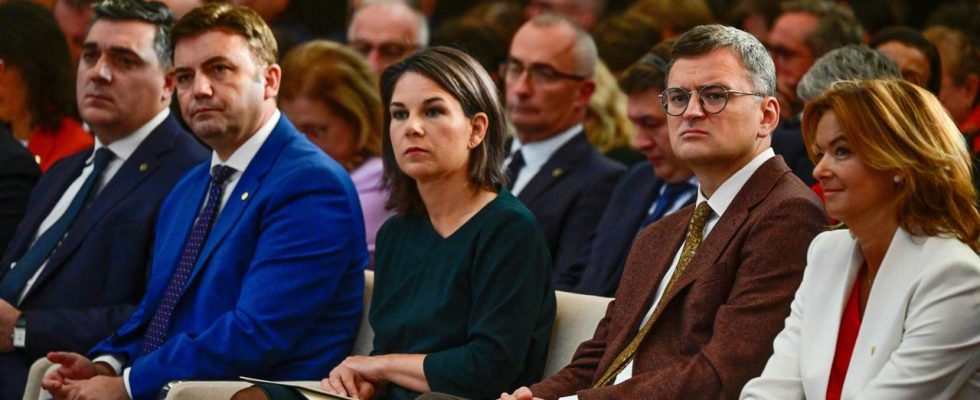The expansion of the European Union promises geopolitical strength – but an alliance that is too large poses the risk of inability to act. In order to be able to act without internal blockage in the future, Foreign Minister Baerbock is calling for comprehensive restructuring.
Federal Foreign Minister Annalena Baerbock has put forward proposals for a far-reaching reform of the European Union (EU). A change is necessary in order to maintain the EU’s ability to act after the desired accession of other countries, said Baerbock. The aim must be to make the EU geopolitically future-proof, even in view of the wars in Ukraine and the Middle East.
“Right now we need strength to swim together against this whirlpool of crises,” said the Green politician at a conference with numerous European foreign and European ministers on the expansion of the EU in Berlin.
The EU should draw up a roadmap with which key reforms could be implemented over the course of the next legislative period of the European Parliament – i.e. between 2024 and 2029 – and against the background of the enlargement debate.
Baerbock: Reform of how the EU functions is necessary
Baerbock formulated the key question at the conference: “How do we ensure that our institutions still function even when there are almost a dozen new member states in the EU?” She described the risk of an impending internal blockade if too many different interests clashed within the alliance.
In her speech, the Federal Foreign Minister presented a series of ideas with which, in her own words, she wants to initiate a discussion process within the EU.
The proposals aim to ensure that in an enlarged EU more decisions should be made according to the majority principle. In addition, the EU Commission and the EU Parliament should not become larger despite enlargement. In addition, violations by member states, for example in matters of the rule of law, must be punished more quickly and states wishing to join should be integrated into EU decision-making processes earlier, said Baerbock.
EU benefits already for candidate countries
Some of the reform proposals therefore provide advantages for candidate countries even before they become full members of the EU. Baerbock, for example, put expanded Erasmus study programs up for discussion. Countries that have completed individual chapters in the accession process could also be invited to the relevant Council meetings in Brussels as observers.
But there should be no “cherry picking” and no compromises on the EU’s foundation of values, warned Baerbock. “There will be no discounts or shortcuts in the accession process, especially not in the area of the rule of law.”
The EU can only be a strong player “if we do what we have been hesitant to do for a long time – overhaul the way our Union functions,” said the Foreign Minister. “Because if the numbers of EU countries increase by almost a third, then our community needs a strong structure from the basement to the roof.”
Mastering EU enlargement despite hurdles
Despite all the hurdles, Baerbock described EU enlargement as a geopolitical necessity. Russian President Vladimir Putin will “continue to try to plow an imperial trench through Europe that will not only separate Ukraine from us, but also Moldova, Georgia and the Western Balkans,” said the Foreign Minister. If these countries were permanently destabilized by Russia, “it would make us all vulnerable.”
In addition to Ukraine and Moldova, the EU’s current candidate countries are Albania, Bosnia-Herzegovina, Montenegro, Serbia, North Macedonia and Turkey. Baerbock also assured Ukraine and Moldova membership in the EU. “The heart of Europe beats in Kiev,” she said. “We want Ukraine to be a member of our European Union. And I am convinced that the European Council in December will also give this signal.”
Reforming the Union and its accession processes is not an easy task and will take a lot of time, Baerbock pointed out.

